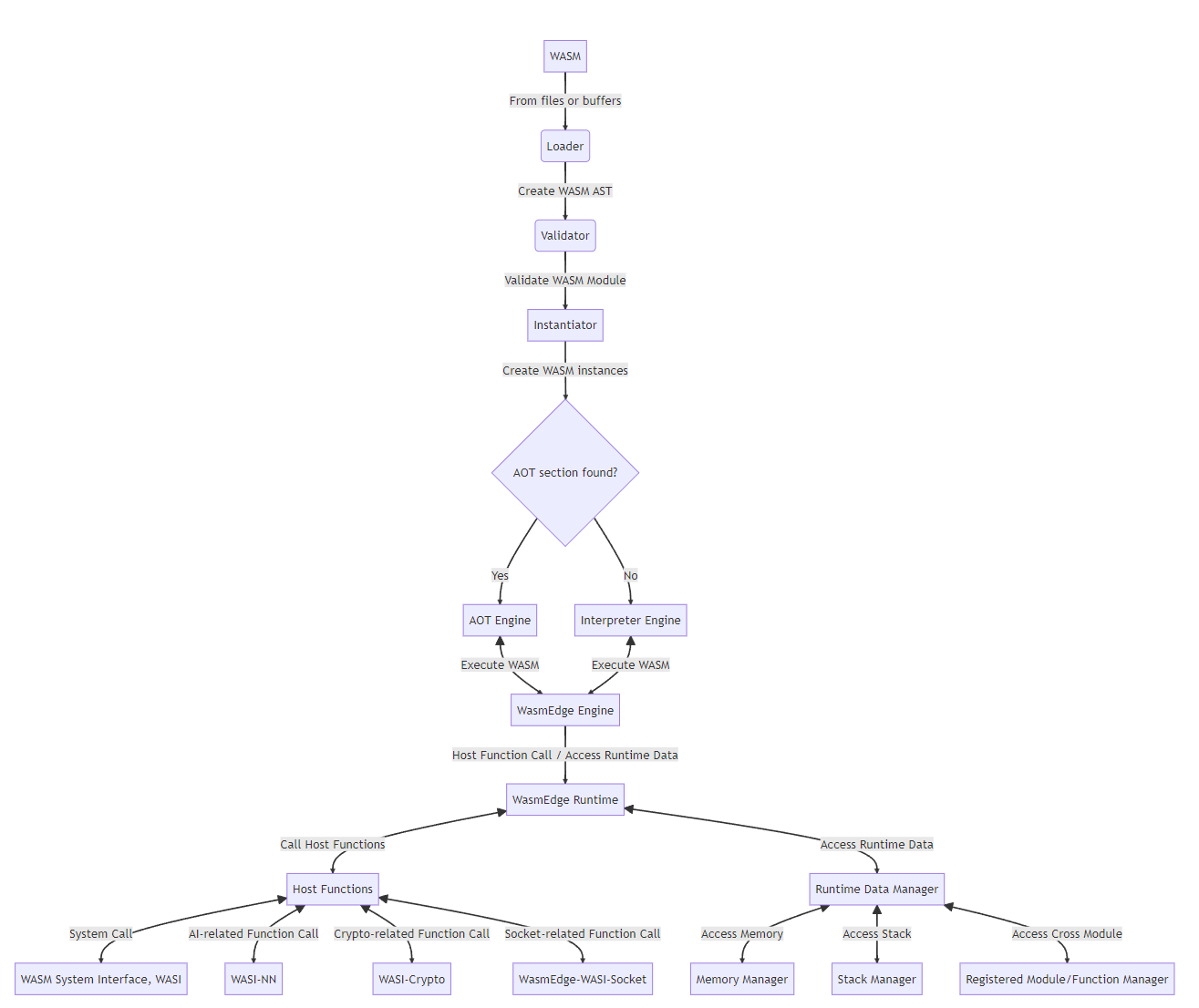During Tool() function in runtimeTool.cpp

- VM instantiation
VM::VM(const Configure &Conf)
: Conf(Conf), Stage(VMStage::Inited),
LoaderEngine(Conf, &Executor::Executor::Intrinsics),
ValidatorEngine(Conf), ExecutorEngine(Conf, &Stat),
Store(std::make_unique<Runtime::StoreManager>()), StoreRef(*Store.get()) {
unsafeInitVM();
}
void VM::unsafeInitVM() {
// Load the built-in modules and the plug-ins.
unsafeLoadBuiltInHosts();
unsafeLoadPlugInHosts();
// Register all module instances.
unsafeRegisterBuiltInHosts();
unsafeRegisterPlugInHosts();
}
- Get Imported modules from WASI,
Runtime::Instance::ModuleInstance *
VM::unsafeGetImportModule(const HostRegistration Type) const {
if (auto Iter = BuiltInModInsts.find(Type); Iter != BuiltInModInsts.cend()) {
return Iter->second.get();
}
return nullptr;
}
- Load Wasm
- Validation Step:
Expect<void> VM::unsafeValidate() {
if (Stage < VMStage::Loaded) {
// When module is not loaded, not validate.
spdlog::error(ErrCode::Value::WrongVMWorkflow);
return Unexpect(ErrCode::Value::WrongVMWorkflow);
}
if (auto Res = ValidatorEngine.validate(*Mod.get())) {
Stage = VMStage::Validated;
return {};
} else {
return Unexpect(Res);
}
}
/// Instantiate a WASM Module. See "include/executor/executor.h".
Expect<std::unique_ptr<Runtime::Instance::ModuleInstance>>
Executor::instantiateModule(Runtime::StoreManager &StoreMgr,
const AST::Module &Mod) {
if (auto Res = instantiate(StoreMgr, Mod)) {
return Res;
} else {
// If Statistics is enabled, then dump it here.
// When there is an error happened, the following execution will not
// execute.
if (Stat) {
Stat->dumpToLog(Conf);
}
return Unexpect(Res);
}
}
// Instantiate module instance. See "include/executor/Executor.h".
Expect<std::unique_ptr<Runtime::Instance::ModuleInstance>>
Executor::instantiate(Runtime::StoreManager &StoreMgr, const AST::Module &Mod,
std::optional<std::string_view> Name) {
// Check the module is validated.
if (unlikely(!Mod.getIsValidated())) {
spdlog::error(ErrCode::Value::NotValidated);
spdlog::error(ErrInfo::InfoAST(ASTNodeAttr::Module));
return Unexpect(ErrCode::Value::NotValidated);
}
// Create the stack manager.
Runtime::StackManager StackMgr;
// Check is module name duplicated when trying to registration.
if (Name.has_value()) {
const auto *FindModInst = StoreMgr.findModule(Name.value());
if (FindModInst != nullptr) {
spdlog::error(ErrCode::Value::ModuleNameConflict);
spdlog::error(ErrInfo::InfoAST(ASTNodeAttr::Module));
return Unexpect(ErrCode::Value::ModuleNameConflict);
}
}
// Insert the module instance to store manager and retrieve instance.
std::unique_ptr<Runtime::Instance::ModuleInstance> ModInst;
if (Name.has_value()) {
ModInst = std::make_unique<Runtime::Instance::ModuleInstance>(Name.value());
} else {
ModInst = std::make_unique<Runtime::Instance::ModuleInstance>("");
}
// Instantiate Function Types in Module Instance. (TypeSec)
for (auto &FuncType : Mod.getTypeSection().getContent()) {
// Copy param and return lists to module instance.
ModInst->addFuncType(FuncType);
}
// Instantiate ImportSection and do import matching. (ImportSec)
const AST::ImportSection &ImportSec = Mod.getImportSection();
if (auto Res = instantiate(StoreMgr, *ModInst, ImportSec); !Res) {
spdlog::error(ErrInfo::InfoAST(ASTNodeAttr::Sec_Import));
spdlog::error(ErrInfo::InfoAST(ASTNodeAttr::Module));
StoreMgr.recycleModule(std::move(ModInst));
return Unexpect(Res);
}
// Instantiate Functions in module. (FunctionSec, CodeSec)
const AST::FunctionSection &FuncSec = Mod.getFunctionSection();
const AST::CodeSection &CodeSec = Mod.getCodeSection();
// This function will always success.
instantiate(*ModInst, FuncSec, CodeSec);
// Instantiate TableSection (TableSec)
const AST::TableSection &TabSec = Mod.getTableSection();
// This function will always success.
instantiate(*ModInst, TabSec);
// Instantiate MemorySection (MemorySec)
const AST::MemorySection &MemSec = Mod.getMemorySection();
// This function will always success.
instantiate(*ModInst, MemSec);
// Add a temp module to Store with only imported globals for initialization.
std::unique_ptr<Runtime::Instance::ModuleInstance> TmpModInst =
std::make_unique<Runtime::Instance::ModuleInstance>("");
for (uint32_t I = 0; I < ModInst->getGlobalImportNum(); ++I) {
TmpModInst->importGlobal(*(ModInst->getGlobal(I)));
}
for (uint32_t I = 0; I < ModInst->getFuncNum(); ++I) {
TmpModInst->importFunction(*(ModInst->getFunc(I)));
}
// Push a new frame {TmpModInst:{globaddrs}, locals:none}
StackMgr.pushFrame(TmpModInst.get(), AST::InstrView::iterator(), 0, 0);
// Instantiate GlobalSection (GlobalSec)
const AST::GlobalSection &GlobSec = Mod.getGlobalSection();
if (auto Res = instantiate(StackMgr, *ModInst, GlobSec); !Res) {
spdlog::error(ErrInfo::InfoAST(ASTNodeAttr::Sec_Global));
spdlog::error(ErrInfo::InfoAST(ASTNodeAttr::Module));
StoreMgr.recycleModule(std::move(ModInst));
return Unexpect(Res);
}
// Pop frame with the temp. module.
StackMgr.popFrame();
// Instantiate ExportSection (ExportSec)
const AST::ExportSection &ExportSec = Mod.getExportSection();
// This function will always success.
instantiate(*ModInst, ExportSec);
// Push a new frame {ModInst, locals:none}
StackMgr.pushFrame(ModInst.get(), AST::InstrView::iterator(), 0, 0);
// Instantiate ElementSection (ElemSec)
const AST::ElementSection &ElemSec = Mod.getElementSection();
if (auto Res = instantiate(StackMgr, *ModInst, ElemSec); !Res) {
spdlog::error(ErrInfo::InfoAST(ASTNodeAttr::Sec_Element));
spdlog::error(ErrInfo::InfoAST(ASTNodeAttr::Module));
StoreMgr.recycleModule(std::move(ModInst));
return Unexpect(Res);
}
// Instantiate DataSection (DataSec)
const AST::DataSection &DataSec = Mod.getDataSection();
if (auto Res = instantiate(StackMgr, *ModInst, DataSec); !Res) {
spdlog::error(ErrInfo::InfoAST(ASTNodeAttr::Sec_Data));
spdlog::error(ErrInfo::InfoAST(ASTNodeAttr::Module));
StoreMgr.recycleModule(std::move(ModInst));
return Unexpect(Res);
}
// Initialize table instances
if (auto Res = initTable(StackMgr, ElemSec); !Res) {
spdlog::error(ErrInfo::InfoAST(ASTNodeAttr::Sec_Element));
spdlog::error(ErrInfo::InfoAST(ASTNodeAttr::Module));
StoreMgr.recycleModule(std::move(ModInst));
return Unexpect(Res);
}
// Initialize memory instances
if (auto Res = initMemory(StackMgr, DataSec); !Res) {
spdlog::error(ErrInfo::InfoAST(ASTNodeAttr::Sec_Data));
spdlog::error(ErrInfo::InfoAST(ASTNodeAttr::Module));
StoreMgr.recycleModule(std::move(ModInst));
return Unexpect(Res);
}
// Instantiate StartSection (StartSec)
const AST::StartSection &StartSec = Mod.getStartSection();
if (StartSec.getContent()) {
// Get the module instance from ID.
ModInst->setStartIdx(*StartSec.getContent());
// Get function instance.
const auto *FuncInst = ModInst->getStartFunc();
// Execute instruction.
if (auto Res = runFunction(StackMgr, *FuncInst, {}); unlikely(!Res)) {
spdlog::error(ErrInfo::InfoAST(ASTNodeAttr::Module));
StoreMgr.recycleModule(std::move(ModInst));
return Unexpect(Res);
}
}
// Pop Frame.
StackMgr.popFrame();
// For the named modules, register it into the store.
if (Name.has_value()) {
StoreMgr.registerModule(ModInst.get());
}
return ModInst;
}
} // namespace Executor
} // namespace WasmEdge


